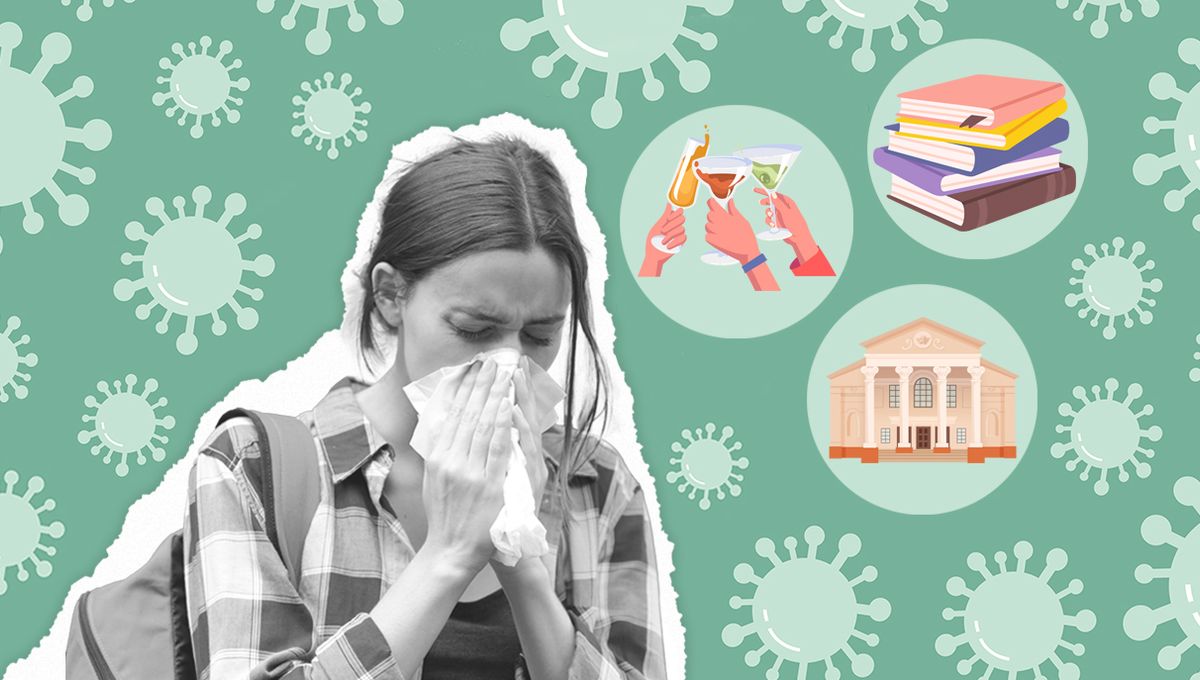
Starting college is supposed to be one of the most exciting times of your life, full of new friends, parties, and the freedom to eat pasta for all three meals a day. And for a while, it can certainly feel like that – then, one day, you wake up with a slightly sore throat. The next thing you know, you can’t remember what it feels like to breathe through your nose. You’ve been struck by the dreaded “freshers’ flu”.
Despite the name, it doesn’t just affect freshmen; the start of a new school year will see sophomores, juniors, and seniors alike struck down by the lurgy. But what actually is freshers’ flu, why does it happen year-in, year-out, and most importantly: is there a way to avoid it?
What is freshers’ flu?
While it might seem like everyone is catching the same thing, that’s not necessarily the case – like the common cold, freshers’ flu is more of a catch-all term for a variety of different pathogens that can have you spending a hefty chunk of your student budget on chicken soup.
This particular rotation of nasties may well include influenza viruses as the name implies, but also other respiratory viruses that we tend to see more of heading into the autumn months, like enteroviruses, rhinoviruses, and coronaviruses (including SARS‑CoV‑2, the one that causes COVID-19).
Symptoms of freshers’ flu might vary case by case, but they’re usually pretty similar to those we’d usually associate with the common cold or the flu, such as a sore throat, cough, runny nose, fatigue, fever, and headache.
It should be noted that some of these symptoms are similar to those of meningitis, a rare but serious infection that students are particularly at risk for. There are vaccines available that can protect against infection, but regardless, it’s helpful to know some of the key symptoms: a high temperature, severe headache, stiff neck, and light sensitivity. Rashes can sometimes appear too – which could be an indication of meningitis if they don’t fade when a glass is pressed on them – but not always, so it’s best not to wait for one to appear.
Why does it happen?
According to an article by molecular biologist Dr Derek Gatherer, in The Conversation, we can’t definitively say why freshers’ flu happens. Gatherer explains that “as far as hard science goes, there is not enough evidence to really understand the origins and patterns of the condition (if it is one condition).”
There are theories, however – many of which hang on the idea that an influx of new students also means an influx of viruses that their classmates’ immune systems haven’t been exposed to before, and that the intense socializing that happens in those first few weeks ups the chances of exposure even more.
Even if that were not the case, the start of the school year also tends to coincide with the start of the annual cold and flu season, a period of the year that also brings people indoors and closer together.
Can it be avoided?
Freshers’ flu is probably harder to avoid than an overly enthusiastic RA. However, there are some steps that can be taken to at least try and reduce the chances of getting sick.
There’s little that can be done to stay away from the crowds – even if you’re not a party animal, people are still enthusiastic about lectures at this time of year – but the usual approach to avoiding respiratory viruses, like washing your hands often, keeping shared surfaces and equipment clean (like that dorm room coffee machine), and using hand sanitizer can help. Also, wearing a mask if you feel ill and can’t avoid going out helps to protect others.
Making sure to eat (including fruit and veg), drink (no, we don’t mean alcohol), and sleep enough can also help to keep the immune system battle-ready, even if those things are easier said than done in amongst socializing and learning.
If freshers’ flu does strike, the approach to treating it is likely a familiar one if you’ve ever had a cold: cozy up in bed, get some sleep, and drink plenty (of water that is – a hangover definitely won’t help).
All “explainer” articles are confirmed by fact checkers to be correct at time of publishing. Text, images, and links may be edited, removed, or added to at a later date to keep information current.
The content of this article is not intended to be a substitute for professional medical advice, diagnosis, or treatment. Always seek the advice of qualified health providers with questions you may have regarding medical conditions.
Source Link: "Freshers' Flu": What Every College Student Needs To Know